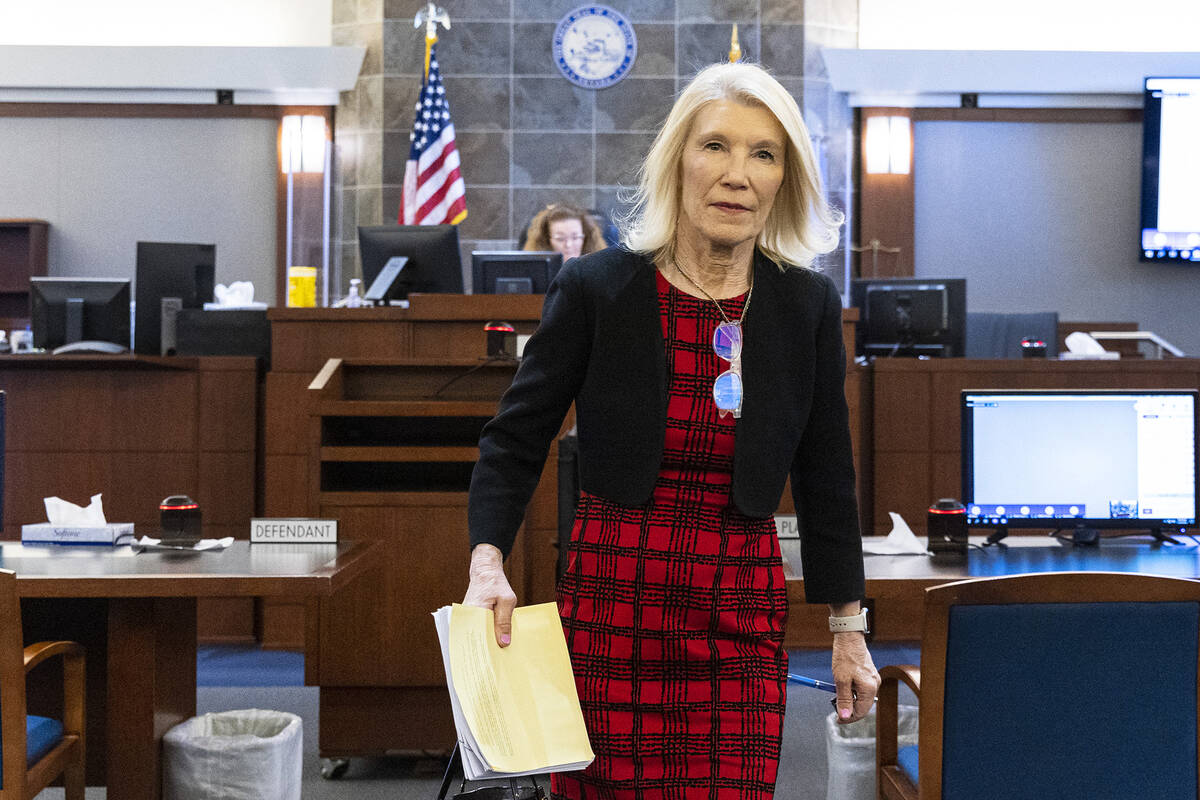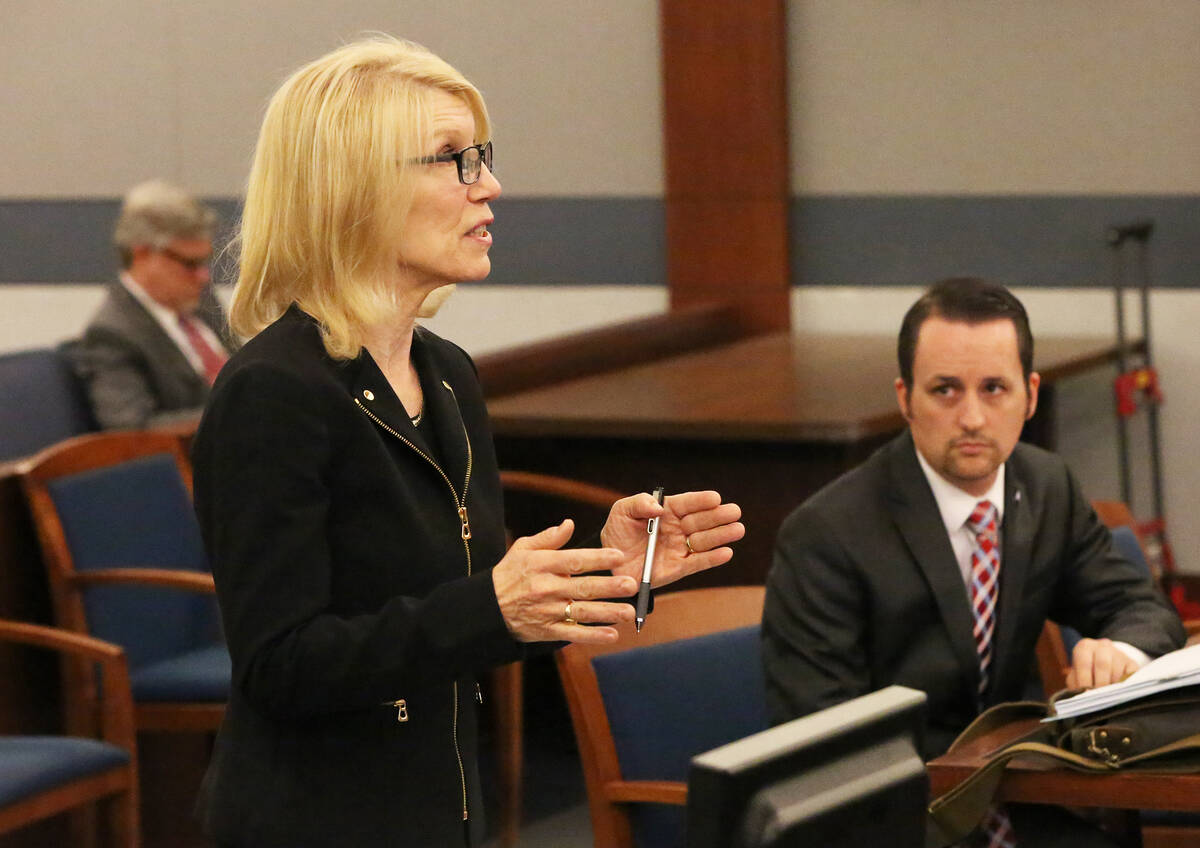‘One hurdle after the other’: How a Las Vegas lawyer got money to victim families in mass shooting
Attorney Alice Denton wanted to protect Las Vegas, and that meant making sure the guns used in the deadliest mass shooting in modern U.S. history would never see the light of day.
Her family-owned law firm took on the task of tallying the estate of Stephen Paddock, who opened fire from his hotel room at the Mandalay Bay on thousands of concertgoers on Oct. 1, 2017, fatally shooting 60 people and injuring hundreds.
But what could have been a relatively straight-forward process was complicated by 49 of the shooter’s guns that were seized by the FBI, creating legal challenges that stretched the court case out over more than 5½ years.
“This has been one hurdle after the other,” said Denton, who has worked in probate law in Nevada for two decades.
Last week, she confirmed in a court hearing that the guns have been destroyed or permanently seized by the FBI, clearing the way for money from the shooter’s estate to be distributed to 61 families. Denton took on the case pro bono, meaning her attorney fees won’t be deducted from the amount going to the families.
A spokesperson for Clark County confirmed Thursday that the county coroner’s office’s official count of the number of victims is 60 — 58 people who died in the immediate aftermath of the shooting, and two other women who died of their injuries more than two years later.
The Las Vegas Review-Journal has previously reported that the 61st death involved a suicide, but Denton said Thursday that she did not know the exact cause of the person’s death, and could not name them. The list of victims was filed under seal in court documents.
Legal complications
After tracking down more than a dozen bank accounts, selling the shooter’s property and deducting taxes and administrative costs, there is nearly $1.3 million to distribute between the families.
In probate law, which settles a deceased person’s will and estate, money is typically distributed to whoever the deceased owed a debt, then to the deceased’s heir. Paddock’s mother was his sole heir because he died without a will, was not married and had no children. But in 2019, Paddock’s mother signed away her rights to his assets.
Adam Hirsch, a professor at University of San Diego’s law school who has taught classes on inheritance law for nearly 40 years, said probate cases will usually unfold quickly, but it’s not unheard of for litigation to stretch the process on for years or decades.
The estates of murdered crime victims aren’t typically parties in probate law, since few perpetrators of tragedies like the Las Vegas mass shooting have any assets to distribute.
“It’s not common, but it does happen, Hirsch said.
The closest analogy to Paddock’s estate, Hirsch said, is the multimillion-dollar estate of Jeffrey Epstein, a portion of which went to settlements for women who accused him of sexual abuse before his death.
Instead of striving for a notable or groundbreaking case, Denton said she took on Paddock’s estate to help the victims, and not Paddock’s family.
“That was a primary aspect of our involvement, we were not going to work for the shooter’s family to get money for them,” she said. “Our whole goal was to ensure the destruction of the guns and to get the money to the victims.”
In order to ensure the guns were destroyed, Denton had to rely on an anonymous donor paying $62,000 for the 49 guns that were recovered.
Denton said the case was near an end in 2020 when a creditor’s claim was filed by Slide Fire Solutions, the company that manufactured the bump stock Paddock used to fire rounds at a rapid pace during the attack. The company, which was facing a class-action lawsuit from victims of the mass shooting, had argued that Paddock was to blame for the attack, not the bump stocks, and that the company was entitled to money from the estate to pay for liability claims.
Victims who had sued the manufacturer and MGM Resorts, which owns Mandalay Bay, had also petitioned to prevent Paddock’s guns from being destroyed so that they could be preserved as evidence in the court proceedings.
The lawsuit against MGM Resorts International reached a multimillion-dollar settlement in 2019. The destruction of the guns was one step closer in December 2021, when the Nevada Supreme Court ruled that gun manufacturers could not be held responsible for the deaths in the mass shooting.
Denton then had to coordinate with the FBI, which wrote in court documents that 36 of the firearms were destroyed in November. The remaining 13 were kept by the agency for training purposes.
Hours of ‘leg work’
Denton’s firm also relied on prominent Las Vegas forensic accountant Larry Bertsch, who was responsible for hundreds of hours of “leg work” in tracking down and selling the shooter’s assets, Denton said. He coordinated the sale of Paddock’s home, inventoried bank accounts and even found gambling chips in the shooter’s belongings that were cashed in.
Bertsch died last week at 85 years old, before he was able to see the completion of the case.
“It was with Larry’s hard work, professionalism and dedication to this case that we have gotten here today,” Denton said during a court hearing on April 20.
Denton said that Bertsch had been hospitalized for weeks, and a member of her firm had to go to the hospital so he could sign final court documents in person. If they hadn’t gotten the signature before Bertsch died, the case could have drawn on for an additional six months.
She and Bertsch took on the case as a passion project, Denton said. She recalled how her friends and family were “horrified” in the aftermath of the mass shooting, including family members who were first responders the night of the massacre.
Denton said taking on the case pro bono was her way to help after tragedy struck her community, and she wanted to find as much money for the victims’ families while protecting future generations.
“The primary goal of our office was to ensure the safety of the children, the people in Las Vegas, and to get the guns destroyed,” she said.
Contact Katelyn Newberg at knewberg@reviewjournal.com or 702-383-0240. Follow @k_newberg on Twitter.
























